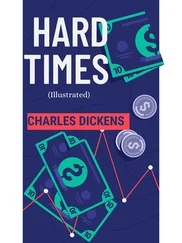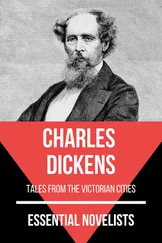The other three sat up at the inn all night in great suspense. At eight o'clock in the morning Mr. Sleary and the dog reappeared: both in high spirits.
“All right, Thquire!” said Mr. Sleary, “your thon may be aboard-athip by thith time. Childerth took him off, an hour and a half after we left there latht night. The horthe danthed the polka till he wath dead beat (he would have walthed if he hadn't been in harneth), and then I gave him the word and he went to thleep comfortable. When that prethiouth young Rathcal thed he'd go for'ard afoot, the dog hung on to hith neck-hankercher with all four legth in the air and pulled him down and rolled him over. Tho he come back into the drag, and there he that, “till I turned the horthe'th head, at half-patht thixth thith morning.”
Mr. Gradgrind overwhelmed him with thanks, of course; and hinted as delicately as he could, at a handsome remuneration in money.
“I don't want money mythelf, Thquire; but Childerth ith a family man, and if you wath to like to offer him a five-pound note, it mightn't be unactheptable. Likewithe if you wath to thtand a collar for the dog, or a thet of bellth for the horthe, I thould be very glad to take “em. Brandy and water I alwayth take.” He had already called for a glass, and now called for another. “If you wouldn't think it going too far, Thquire, to make a little thpread for the company at about three and thixth ahead, not reckoning Luth, it would make “em happy.”
All these little tokens of his gratitude, Mr. Gradgrind very willingly undertook to render. Though he thought them far too slight, he said, for such a service.
“Very well, Thquire; then, if you'll only give a Horthe-riding, a bethpeak, whenever you can, you'll more than balanthe the account. Now, Thquire, if your daughter will ethcuthe me, I thould like one parting word with you.”
Louisa and Sissy withdrew into an adjoining room; Mr. Sleary, stirring and drinking his brandy and water as he stood, went on:
“Thquire,—you don't need to be told that dogth ith wonderful animalth.”
“Their instinct,” said Mr. Gradgrind, “is surprising.”
“Whatever you call it—and I'm bletht if I know what to call it'—said Sleary, “it ith athtonithing. The way in whith a dog'll find you—the dithtanthe he'll come!”
“His scent,” said Mr. Gradgrind, “being so fine.”
“I'm bletht if I know what to call it,” repeated Sleary, shaking his head, “but I have had dogth find me, Thquire, in a way that made me think whether that dog hadn't gone to another dog, and thed, “You don't happen to know a perthon of the name of Thleary, do you? Perthon of the name of Thleary, in the Horthe-Riding way—thtout man—game eye?” And whether that dog mightn't have thed, “Well, I can't thay I know him mythelf, but I know a dog that I think would be likely to be acquainted with him.” And whether that dog mightn't have thought it over, and thed, “Thleary, Thleary! O yeth, to be thure! A friend of mine menthioned him to me at one time. I can get you hith addreth directly.” In conthequenth of my being afore the public, and going about tho muth, you thee, there mutht be a number of dogth acquainted with me, Thquire, that I don't know!”
Mr. Gradgrind seemed to be quite confounded by this speculation.
“Any way,” said Sleary, after putting his lips to his brandy and water, “ith fourteen month ago, Thquire, thinthe we wath at Chethter. We wath getting up our Children in the Wood one morning, when there cometh into our Ring, by the thtage door, a dog. He had travelled a long way, he wath in a very bad condithon, he wath lame, and pretty well blind. He went round to our children, one after another, as if he wath a theeking for a child he know'd; and then he come to me, and throwd hithelf up behind, and thtood on hith two forelegth, weak ath he wath, and then he wagged hith tail and died. Thquire, that dog wath Merrylegth.”
“Sissy's father's dog!”
“Thethilia'th father'th old dog. Now, Thquire, I can take my oath, from my knowledge of that dog, that that man wath dead—and buried—afore that dog come back to me. Joth'phine and Childerth and me talked it over a long time, whether I thould write or not. But we agreed, “No. There'th nothing comfortable to tell; why unthettle her mind, and make her unhappy?” Tho, whether her father bathely detherted her; or whether he broke hith own heart alone, rather than pull her down along with him; never will be known, now, Thquire, till—no, not till we know how the dogth findth uth out!”
“She keeps the bottle that he sent her for, to this hour; and she will believe in his affection to the last moment of her life,” said Mr. Gradgrind.
“It theemth to prethent two thingth to a perthon, don't it, Thquire?” said Mr. Sleary, musing as he looked down into the depths of his brandy and water: “one, that there ith a love in the world, not all Thelf-interetht after all, but thomething very different; t'other, that it bath a way of ith own of calculating or not calculating, whith thomehow or another ith at leatht ath hard to give a name to, ath the wayth of the dogth ith!”
Mr. Gradgrind looked out of window, and made no reply. Mr. Sleary emptied his glass and recalled the ladies.
“Thethilia my dear, kith me and good-bye! Mith Thquire, to thee you treating of her like a thithter, and a thithter that you trutht and honour with all your heart and more, ith a very pretty thight to me. I hope your brother may live to be better detherving of you, and a greater comfort to you. Thquire, thake handth, firtht and latht! Don't be croth with uth poor vagabondth. People mutht be amuthed. They can't be alwayth a learning, nor yet they can't be alwayth a working, they an't made for it. You mutht have uth, Thquire. Do the withe thing and the kind thing too, and make the betht of uth; not the wurtht!”
“And I never thought before,” said Mr. Sleary, putting his head in at the door again to say it, “that I wath tho muth of a Cackler!”
IT is a dangerous thing to see anything in the sphere of a vain blusterer, before the vain blusterer sees it himself. Mr. Bounderby felt that Mrs. Sparsit had audaciously anticipated him, and presumed to be wiser than he. Inappeasably indignant with her for her triumphant discovery of Mrs. Pegler, he turned this presumption, on the part of a woman in her dependent position, over and over in his mind, until it accumulated with turning like a great snowball. At last he made the discovery that to discharge this highly connected female—to have it in his power to say, “She was a woman of family, and wanted to stick to me, but I wouldn't have it, and got rid of her'—would be to get the utmost possible amount of crowning glory out of the connection, and at the same time to punish Mrs. Sparsit according to her deserts.
Filled fuller than ever, with this great idea, Mr. Bounderby came in to lunch, and sat himself down in the dining-room of former days, where his portrait was. Mrs. Sparsit sat by the fire, with her foot in her cotton stirrup, little thinking whither she was posting.
Since the Pegler affair, this gentlewoman had covered her pity for Mr. Bounderby with a veil of quiet melancholy and contrition. In virtue thereof, it had become her habit to assume a woful look, which woful look she now bestowed upon her patron.
“What's the matter now, ma'am?” said Mr. Bounderby, in a very short, rough way.
“Pray, sir,” returned Mrs. Sparsit, “do not bite my nose off.”
“Bite your nose off, ma'am?” repeated Mr. Bounderby. “Your nose!” meaning, as Mrs. Sparsit conceived, that it was too developed a nose for the purpose. After which offensive implication, he cut himself a crust of bread, and threw the knife down with a noise.
Читать дальше
Конец ознакомительного отрывка
Купить книгу












